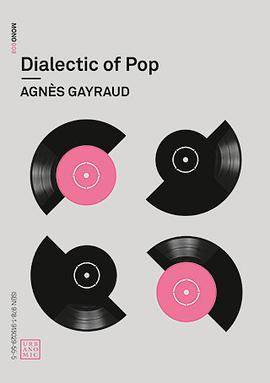Dialectic of Pop
Douban
Agnes Gayraud oversætter: Robin Mackay / Daniel Miller …
overblik
In the first major philosophical treatise on the subject, Agnès Gayraud explores all the paradoxes of pop—its inauthentic authenticity, its mass production of emotion and personal resonance, its repetitive novelty, its precision engineering of seduction—and calls for pop (in its broadest sense, encompassing all genres of popular recorded music) to be recognised as a modern technologically-mediated art form to rank alongside cinema and photography.
A thoroughgoing engagement with Adorno’s fierce critique of ‘standardised light popular music’, Dialectic of Pop tracks the transformations of the pop form and its audience over the course of the twentieth century, from Hillbilly to R&B, from Lead Belly to Drake.
Inseparable from the materiality of its technical media, indifferent and intractable to the perspectives of high culture, pop subverts notions of authenticity and inauthenticity, original and copy, aura and commodity, medium and message. Gayraud demonstrates that, far from being the artless and trivial mass-produced pabulum denigrated by Adorno, pop is a rich, self-reflexive artform that recognises its own contradictions, incorporates its own productive negativity, and often flourishes by thinking ‘against itself’.
Dialectic of Pop sings the praises of pop as a constitutively impure form resulting from the encounter between industrial production and the human predilection for song, and diagnoses the prospects for twenty-first century pop as it continues to adapt to ever-changing technological mediations.
contents
Introduction
Borders; Pop and Theory; Canary in the Coalmine; Aesthetic Judgment; Dialectical Inclination; A Most Curious Hater; Hyperbolic Hater; Objective Enemy, Subjective Ally
Part One: Form
Chapter One. Pop
I. Artistic Form
Recording-Works; Other Regimes of Production; An Art of Separated Sounds: Situated Sounds, Restored Sounds; Porosities; Taboo; Mass Art
II. Aesthetic Form
Constellation; Promise; The Utopia of Popularity; The Canon of Popularity; The Dream and the Ashes
Chapter 2. Anti-Pop
I. The Dystopia of Popularity
The Party’s Over (The Steel Bath of Fun; Spoil the Party); Rage (Emancipation; Dionysus Disciplined); Culture Industry (An Oxymoron; Secession; The Romanticism of the Advocates of Mass Art; The Popular as Injunction); Jingles (System; Tolerance and Goodwill; The Rhetoric of Conspiracy; The Gruff Voice of the Wolf; Contamination).
II. Modern or Nothing
The Excluded (No More Dancing; Retrenchment; Nuance; Modern is Already Old; Counter-Alliance)
Chapter 3. No Synthesis: The Broken Form of Pop
Contradictions; Negative Dialectics
Part Two. Figures
Chapter 1. The Hillbilly Paradox: Uprooted Authenticity
I. Temporal Paradoxes
Original Industry; Old-Time Music and ‘Hillbillies’; Romantic Revivals;The Hillbilly Paradox
II. Mediation and Source
Effect of Presence; Reproducible Aura; A Foggy Mist?
III. Uprootings
Roots Aesthetics; Far from Home; Uprooted Folk; Here and There
IV. Globalised Local Colour
The Ethnographic Preservation of Specificity; Strange World; The Local Colour Industry; Aesthetic Autonomisation; Hybridisation/Appropriation
Chapter 2. The Pop Subject: Democratised Genius
I. Situated Individualities
Embodiment (Disembodiment [The Jazz-Subject]; Immersion [Into This World We’re Thrown]); Particular Conditions (The Aesthetic Truth of Particularity; Emancipation; Rich and Poor [Class]; From Youth to the Generation; Gender; Intersections; Representation; Universalisation [Betrayal])
II. Democratised Genius
Ingenium; Untrained; Capturing the Unique (All Voices Without Exception; Vocal Norms; Imitation/Travesty; Trickery; Failure of the Naturalist Position; The Second Body of the Pop Song; A Robot That Imitates a Man Imitating a Nightingale); The Surge (Impostures; Aprotropaic Idiocy)
III. More and Less Than a Subject
Super-Subject (The Resistible Rise of the Star; Skull; Refusal of Popularity; Christology); Beyond Pathos
Chapter 3. Hits and Hooks: Rationalised Magic
I. Poetics of the Hook
Keep it Simple; The Hook; Articulated Language; Glossolalia
II. Aesthetic Relation
Communication; Reiteration (Ourobouros); Infinite Purposiveness; Rapture
III. Fabrication
Knowhow; The Manual (For Everyone); Division of Labour; Craft; Standardisation; Standards; Format; They Changed My Song
IV. Cosmetics
Pseudo-Individualisations; Performers, etc.; Eclecticism; Glamour, or The Art of Thickening; Internal Dialectic
V. Subjective Supplement
Childhood Epiphanies; Ghost Train; ‘Almost-Hits’ and ‘Already-No-Mored’; Empathy for the Reified
Chapter 4. Pop and Progress: Historicised Innocence
I. Off-ground Modernism
On a Par With the Achievements of the Age; ‘Previously Unimaginable’; Teleology; A Paradoxical Transposition; Cycles; Aesthetic Pendulum; Did Someone Say Progress?
II. Musical Material
First Listen (The Song Form; Tonality; Colours and Sounds); Second Listen (Degraded Transmission—The Sound of Electricity; Playing Electricity; Technical Progress); Third Listen (Any Music Whatsoever)
III. Another History of the Musical Art of Pop
Erudite Subjective Reports; Archipelagos; Epiphanies
IV. Return of the Negative
Inadequations; A Music They Can’t Steal From Us; Revivalism; Hypermnesia; Loss of Innocence; Sincerity or Irony; Art and Life
Conclusion
Acknowledgements
Index of Names
Index of Subjects
Index of Pop Works
Bibliography